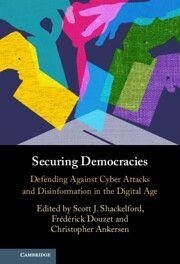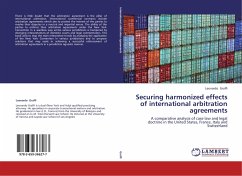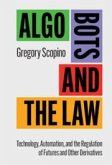Securing Democracies
Defending Against Cyber Attacks and Disinformation in the Digital Age
Herausgeber: Shackelford, Scott J; Ankersen, Christopher; Douzet, Frédérick
Versandkostenfrei innerhalb Deutschlands
126,99 €
inkl. MwSt.
Versandkostenfrei*
Erscheint vorauss. 31. Januar 2026
Melden Sie sich
hier
hier
für den Produktalarm an, um über die Verfügbarkeit des Produkts informiert zu werden.

63 °P sammeln
Securing Democracies
Defending Against Cyber Attacks and Disinformation in the Digital Age
Herausgeber: Shackelford, Scott J; Ankersen, Christopher; Douzet, Frédérick
- Gebundenes Buch
"This book assembles a diverse, global set of scholars and practitioners who focus on securing election infrastructure as well as the overriding problem of managing misinformation, disinformation, and deep fakes. Our main areas of focus are the geopolitical front lines, namely Eastern Europe, the Middle East, and East Asia"--
Andere Kunden interessierten sich auch für
![Securing harmonized effects of international arbitration agreements Securing harmonized effects of international arbitration agreements]() Leonardo GraffiSecuring harmonized effects of international arbitration agreements36,99 €
Leonardo GraffiSecuring harmonized effects of international arbitration agreements36,99 €![Personal Genome Medicine Personal Genome Medicine]() Michael J MalinowskiPersonal Genome Medicine108,99 €
Michael J MalinowskiPersonal Genome Medicine108,99 €![Secured Finance Law in China and Hong Kong Secured Finance Law in China and Hong Kong]() Mark WilliamsSecured Finance Law in China and Hong Kong48,99 €
Mark WilliamsSecured Finance Law in China and Hong Kong48,99 €![Algo Bots and the Law Algo Bots and the Law]() Gregory ScopinoAlgo Bots and the Law134,99 €
Gregory ScopinoAlgo Bots and the Law134,99 €![Labour Law Labour Law]() Hugh CollinsLabour Law63,99 €
Hugh CollinsLabour Law63,99 €![Constitutional Contagion Constitutional Contagion]() Wendy E ParmetConstitutional Contagion68,99 €
Wendy E ParmetConstitutional Contagion68,99 €![Injunctions Against Intermediaries in the European Union Injunctions Against Intermediaries in the European Union]() Martin HusovecInjunctions Against Intermediaries in the European Union121,99 €
Martin HusovecInjunctions Against Intermediaries in the European Union121,99 €-
-
-
"This book assembles a diverse, global set of scholars and practitioners who focus on securing election infrastructure as well as the overriding problem of managing misinformation, disinformation, and deep fakes. Our main areas of focus are the geopolitical front lines, namely Eastern Europe, the Middle East, and East Asia"--
Produktdetails
- Produktdetails
- Verlag: Cambridge University Press
- Seitenzahl: 423
- Erscheinungstermin: 31. Januar 2026
- Englisch
- ISBN-13: 9781009574136
- ISBN-10: 1009574132
- Artikelnr.: 72600424
- Herstellerkennzeichnung
- Libri GmbH
- Europaallee 1
- 36244 Bad Hersfeld
- gpsr@libri.de
- Verlag: Cambridge University Press
- Seitenzahl: 423
- Erscheinungstermin: 31. Januar 2026
- Englisch
- ISBN-13: 9781009574136
- ISBN-10: 1009574132
- Artikelnr.: 72600424
- Herstellerkennzeichnung
- Libri GmbH
- Europaallee 1
- 36244 Bad Hersfeld
- gpsr@libri.de
1. Introduction [strategic/three regional hot spots]; Part I. Challenges to
Democratic Institutions: 2. Hacking elections: contemporary developments in
historical perspective Andy Grotto and Ash Narayan; 3. From free speech to
false speech: analyzing foreign online disinformation campaigns targeting
democracies Rachel Brooks; 4. Cyber challenges to democracy and soft
power's dark side Renee Marlin-Bennett; 5. Cyber disinformation risk
perception and control: integration of the extended theory of planned
behavior and a structural equation model Mägorzata Päkowska and Ioana
Vasiu; Part II. Case Studies: 6. Innovative frontrunner or delayed by
political gridlock? Israel's attempts at countering disinformation Inga
Trauthig and Gabrielle Beacken; 7. Israel information strategies and
maneuvers David Amsellem; 8. Ukraine's support coalition and the long
(Info) war: mitigating the disinformation threat to democratic
collaboration Jaclyn A. Kerr; 9. Weapons of mass derision: humor and
democracy: Russia case study Maria Shardakova et al.; 10. Election cyber
threats in Central Asia: a multistakeholder approach to tackling election
interference and increasing resilience Pavlina Pavlova; 11. Stacking up for
resilience - DPI: the India way Ravi Nayyar; 12. The domestication of
cybersecurity in authoritarian regime: China's media narrative on
cybersecurity and its challenge to democracy Jun Liu; 13. Defending
Taiwan's democracy in the internet commons Simon Sun; Part III. Policy
Responses: 14. Some truths about lies-misinformation and inequality in
policy making and politics Lindsay Flynn and Barbara Allen; 15. Getting a
grip on disinformation: from distrust to trust within learning communities
Deike Shulz et al.
Democratic Institutions: 2. Hacking elections: contemporary developments in
historical perspective Andy Grotto and Ash Narayan; 3. From free speech to
false speech: analyzing foreign online disinformation campaigns targeting
democracies Rachel Brooks; 4. Cyber challenges to democracy and soft
power's dark side Renee Marlin-Bennett; 5. Cyber disinformation risk
perception and control: integration of the extended theory of planned
behavior and a structural equation model Mägorzata Päkowska and Ioana
Vasiu; Part II. Case Studies: 6. Innovative frontrunner or delayed by
political gridlock? Israel's attempts at countering disinformation Inga
Trauthig and Gabrielle Beacken; 7. Israel information strategies and
maneuvers David Amsellem; 8. Ukraine's support coalition and the long
(Info) war: mitigating the disinformation threat to democratic
collaboration Jaclyn A. Kerr; 9. Weapons of mass derision: humor and
democracy: Russia case study Maria Shardakova et al.; 10. Election cyber
threats in Central Asia: a multistakeholder approach to tackling election
interference and increasing resilience Pavlina Pavlova; 11. Stacking up for
resilience - DPI: the India way Ravi Nayyar; 12. The domestication of
cybersecurity in authoritarian regime: China's media narrative on
cybersecurity and its challenge to democracy Jun Liu; 13. Defending
Taiwan's democracy in the internet commons Simon Sun; Part III. Policy
Responses: 14. Some truths about lies-misinformation and inequality in
policy making and politics Lindsay Flynn and Barbara Allen; 15. Getting a
grip on disinformation: from distrust to trust within learning communities
Deike Shulz et al.
1. Introduction [strategic/three regional hot spots]; Part I. Challenges to
Democratic Institutions: 2. Hacking elections: contemporary developments in
historical perspective Andy Grotto and Ash Narayan; 3. From free speech to
false speech: analyzing foreign online disinformation campaigns targeting
democracies Rachel Brooks; 4. Cyber challenges to democracy and soft
power's dark side Renee Marlin-Bennett; 5. Cyber disinformation risk
perception and control: integration of the extended theory of planned
behavior and a structural equation model Mägorzata Päkowska and Ioana
Vasiu; Part II. Case Studies: 6. Innovative frontrunner or delayed by
political gridlock? Israel's attempts at countering disinformation Inga
Trauthig and Gabrielle Beacken; 7. Israel information strategies and
maneuvers David Amsellem; 8. Ukraine's support coalition and the long
(Info) war: mitigating the disinformation threat to democratic
collaboration Jaclyn A. Kerr; 9. Weapons of mass derision: humor and
democracy: Russia case study Maria Shardakova et al.; 10. Election cyber
threats in Central Asia: a multistakeholder approach to tackling election
interference and increasing resilience Pavlina Pavlova; 11. Stacking up for
resilience - DPI: the India way Ravi Nayyar; 12. The domestication of
cybersecurity in authoritarian regime: China's media narrative on
cybersecurity and its challenge to democracy Jun Liu; 13. Defending
Taiwan's democracy in the internet commons Simon Sun; Part III. Policy
Responses: 14. Some truths about lies-misinformation and inequality in
policy making and politics Lindsay Flynn and Barbara Allen; 15. Getting a
grip on disinformation: from distrust to trust within learning communities
Deike Shulz et al.
Democratic Institutions: 2. Hacking elections: contemporary developments in
historical perspective Andy Grotto and Ash Narayan; 3. From free speech to
false speech: analyzing foreign online disinformation campaigns targeting
democracies Rachel Brooks; 4. Cyber challenges to democracy and soft
power's dark side Renee Marlin-Bennett; 5. Cyber disinformation risk
perception and control: integration of the extended theory of planned
behavior and a structural equation model Mägorzata Päkowska and Ioana
Vasiu; Part II. Case Studies: 6. Innovative frontrunner or delayed by
political gridlock? Israel's attempts at countering disinformation Inga
Trauthig and Gabrielle Beacken; 7. Israel information strategies and
maneuvers David Amsellem; 8. Ukraine's support coalition and the long
(Info) war: mitigating the disinformation threat to democratic
collaboration Jaclyn A. Kerr; 9. Weapons of mass derision: humor and
democracy: Russia case study Maria Shardakova et al.; 10. Election cyber
threats in Central Asia: a multistakeholder approach to tackling election
interference and increasing resilience Pavlina Pavlova; 11. Stacking up for
resilience - DPI: the India way Ravi Nayyar; 12. The domestication of
cybersecurity in authoritarian regime: China's media narrative on
cybersecurity and its challenge to democracy Jun Liu; 13. Defending
Taiwan's democracy in the internet commons Simon Sun; Part III. Policy
Responses: 14. Some truths about lies-misinformation and inequality in
policy making and politics Lindsay Flynn and Barbara Allen; 15. Getting a
grip on disinformation: from distrust to trust within learning communities
Deike Shulz et al.







